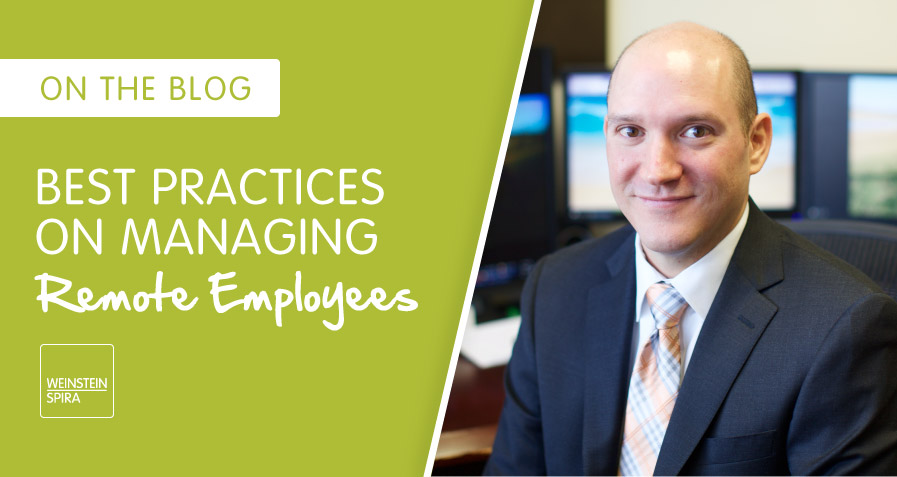There are various forms of working remotely, a popular work style that is catching on more and more as companies try to help employees achieve work-life balance. For example, at Weinstein Spira one of the perks is to be able to work from home one day a week after one year on the job. In auditing departments, it takes on a different form, as entire teams may work at a client location (across town or in a different state) for extended periods of time; thus, assuming a “temporary” remote status. And then there are the more “permanent” type of remote workers, who may have moved away but continue to work for the same company. We have two such employees who work from Colorado on an ongoing basis.
For this arrangement to be successful, managers of remote employees need to pay attention to the unique nature of the relationship, with both tangible and intangible requirements detailed below.
Common Definition:
Working remotely means that a manager needs to supervise someone who is consistently not in the office, and in some cases not even in the same city, state, or country.
Seamless Communication
Having a seamless communications infrastructure that accommodates remote workers is critical. Whether it is “call forwarding” or a more sophisticated, computerized phone system capability, it should feel like you are calling a co-worker right down the hall. That means they have an assigned phone extension that will ring on their cell phone, or a “soft phone” installed on their computer. Likewise, when remote workers make a call to a colleague or a client, it should look like they are internal. They should also be able to send instant messages via the same internal messaging as everyone else and participate in video conferencing with ease. The last thing you want is to make it difficult to get in touch with someone just because they are working remotely, or delay back and forth communications because they are not visible within the office.
Remote Site Visits
When managing employee teams at a remote client site, it is a good idea to hold virtual site visits using video calling for face-to-face time, enabling you to see actual expressions and reactions during important conversations. Screen sharing is another way to connect and problem solve on specific issues from afar.
But there is nothing like a real site visit to collaborate in person with members of your team. This allows quick feedback as opposed to waiting for email replies. And because remote employees do not have the benefit of water cooler talk or kitchen banter, they need to be filled in on a regular basis about what’s happening in the company. For those permanently working from an out-of-state location, it is best if they visit the home office once or twice a year to attend an annual company meeting, or to schedule client meetings, and even lunch with peers or management. This helps build better bonds than remaining totally isolated.
Delivering Evaluations and Progress Reports
A disadvantage of remote workers is that absence can insulate them from receiving informal evaluation of their work. Often, they must rely on more formal evaluations conducted once or twice a year to know how they are doing. Managers should make a concerted effort to provide ongoing feedback, realizing that it is more difficult when working remotely to gauge your performance so that continual improvements can be made. There’s no “pat on the back” opportunities, so kudos need to be communicated another way, even a smiley face in an instant message can be effective. On the flip side, it also behooves the remote employee to actively seek out feedback (and be encouraged to do so). Weekly status reports or calls are a great way for assessing the progress being made.
The Importance of Trust and Respect
When hiring employees, trust is a key factor. So, if you trusted someone enough to hire them, it follows that they can be trusted to work remotely. It is also important to treat remote employees the same way you treat local employees: with the same respect, consideration and expectations. Furthermore, it is a two-way street; whereby, the person working offsite needs to live up to those expectations if they are to maintain a relationship of trust.
To learn more about Weinstein Spira’s remote working positions, visit our career opportunites page here.



